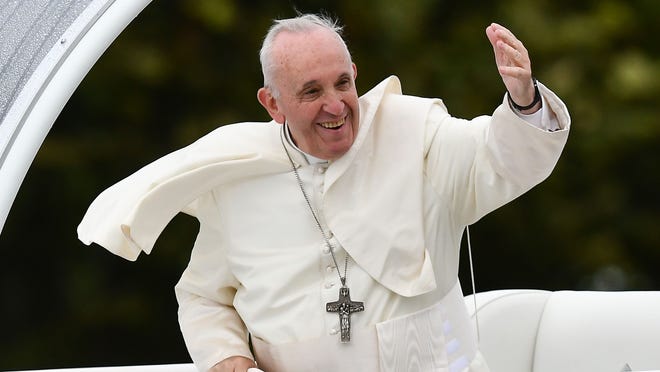VATICAN CITY — Catholic bishops across the Amazon on Saturday called for the ordination of married men as priests to address the shortage of clergy in the region, a historic proposal that would upend centuries of Roman Catholic tradition.
The majority of the 180 bishops from nine Amazonian countries have also called on the Vatican to reopen a debate on the ordination of women deacons, saying that “it is urgent that the church in the Amazon promotes and confers ministries on men and women of fairly”.
The proposals were in a final document approved Saturday at the end of a three-week synod on the Amazon, which Pope Francis called in 2017 to draw attention to saving the rainforest and better serving its peoples. indigenous.
The Catholic Church, which contains nearly two dozen different rites, already allows married priests in Eastern Rite churches and in cases where married Anglican priests have converted. But if Francis accepts the proposal, it would be a first for the Latin Rite church for a millennium.
Yet the proposals passed Saturday also call for the development of a new “Amazonian Rite” that would reflect the unique spirituality, cultures and needs of the Amazonian faithful.
Report:Catholic Archdiocese of New York fires all priests accused of sex abuse
Look:A 400-year-old Japanese temple trusts a robot priest
Francis told the bishops at the end of the vote that he would indeed reopen the work of a 2016 commission that had studied the issue of women deacons. And he said he planned to take general recommendations from the bishops and prepare his own document before the end of the year.
Some conservatives and traditionalists have warned that any papal overture to married priests or female deacons would lead the church to ruin. They accused the synod organizers and even the pope himself of heresy for even considering flexibility on compulsory priestly celibacy.
They expressed their outrage most visibly this week when thieves stole three indigenous statues of a naked pregnant woman from a church in the Vatican area and threw them into the Tiber.
The statues, which curators said were pagan idols, were recovered unharmed by Italian Carabinieri police. One was on display on Saturday as the synod bishops voted on the final document, which was approved, with each paragraph receiving the required two-thirds majority.
The synod’s most controversial proposals concerned whether to allow married men to be ordained priests, to address a shortage of priests that has meant some of the most isolated Amazon communities go months without a proper Mass. The paragraph containing the proposal was the most disputed in the vote, but obtained the required majority 128-41.
The proposal calls for the establishment of criteria “for ordaining priests suitable and esteemed men of the community, who have had a fruitful permanent diaconate and are receiving adequate training for the priesthood, having a legitimately constituted and stable family, to support the life of the Christian community through the preaching of the Word and the celebration of the sacraments in the most remote areas of the Amazon region”.
The paragraph ended by noting that some participants wanted a “more universal approach” to the proposal – suggesting support for married priests elsewhere in the world.
The celibate priesthood has been a tradition of the Latin Rite Catholic Church since the 11th century, imposed in part for financial reasons to ensure that priests’ property passes to the Church and not to heirs.
Francis has long said that he values discipline and the gift of celibacy, but that can change, as it is about discipline and tradition, not doctrine.
Opinion:Don’t blame incivility on religion. Christian principles are an antidote to wickedness.
The first Latin American pope in history has been particularly attentive to the argument for ordaining ‘viri probati’ – or married men of proven virtue – in the Amazon, where Protestant and Evangelical churches court Catholic souls in the absence of vibrant Catholic communities where the Eucharist can be celebrated regularly.
The second most contested proposal concerned the ordination of women deacons, a type of ministry in the church that allows preaching, performing marriages and baptisms, but not consecrating the Eucharist.
The bishops of the synod did not come right away and call for female deacons, but rather that the 2016 Vatican study commission on the female diaconate hear the synod speak about “our experiences and reflections” and come to a decision. The paragraph went from 137-30.
In 2016, Francis accepted a request from the international organization of religious sisters to set up a study commission to explore the role of women deacons in the early church, responding to an insistent call for women to be granted a greater role in decision-making, governance and ministry. since the Catholic priesthood is reserved for men.
The commission gave its report to François but the results were never published and François said afterwards that there was no agreement among the members of the commission.
In addition to deacons, the final document called for the institution of a new ministry of “women’s community leadership” and a revision of a 1960s church law to allow women to be trained as lectors and acolytes. .
And he said cryptically that for a limited time, a bishop can entrust “the exercise of the pastoral care” of a community to “a person” who is not a priest, but not necessarily male either.
However, in a sign that women still have some way to go in the church’s decision-making parity, no women were allowed to vote on the final document.
Thirty-five women, including nuns and superiors, were named experts at the synod and contributed to the final document, but only the 181 men voted.

